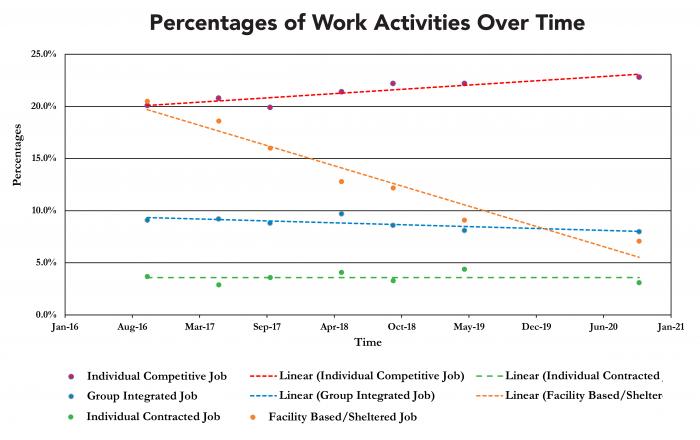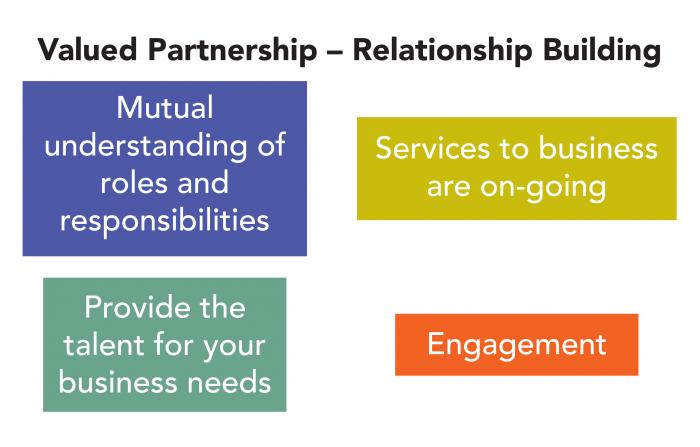Nothing About Us Without Us: From Subminimum Wage to Meaningful Employment in Maryland
Authors: Tami Goldsmith; Stacey Herman, MS Ed, CESP; Mat Rice
People On the Go Maryland (POG) helps people with disabilities gain competitive, integrated employment through grassroots efforts, legislation, disability policy development and collaboration to facilitate change at the state and local levels.
The Neurodiversity at Work initiative at Kennedy Krieger Institute is a multi-faceted effort to increase accessibility to employment both within our own organization and in external organizations. Meaningful Community Services at Kennedy Krieger Institute help individuals with disabilities obtain and maintain meaningful employment and community engagement through a person-centered approach.
Working with Grassroots Advocacy Organizations in Maryland to Eliminate the Use of Subminimum Wage Practices
In 2014–2015, a fair wage workgroup convened in Maryland to study the impact of phasing out the use of subminimum wage certificates, as outlined by Section 14(c) of the U.S. Fair Labor Standards Act, to pay people with disabilities below minimum wage. Despite evidence that the use of subminimum wage certificates was on the decline, both nationally and within Maryland, the workgroup ultimately concluded that phasing out the use of 14(c) certificates would be an overly complicated and time-consuming process.
A Statewide workgroup was formed At the request of Maryland Sen. Thomas Middleton, Bob Hoffman, executive director of Maryland Works, put together a statewide 14(c) workgroup to monitor the use of 14(c) certificates at the state level.
The statewide workgroup considered several questions: What were the trends in the use of 14(c) certificates? Was use of the certificates increasing or decreasing? What new federal policies might affect the use of 14(c) certificates? The workgroup found that many employment service providers within the state had already transitioned away from the use of 14(c) certificates or were investigating what it would take to do so. The workgroup’s ultimate finding was that the state should begin the process of phasing out the use of 14(c) certificates.
Following those recommendations, POG conducted a survey of its members about 14(c) certificates. POG found that the majority of self-advocates being paid less than minimum wage (many of whom had spent time in what is known within the advocacy community as “sheltered work”) were in favor of systematically ending the use of 14(c) certificates and closing the door to sheltered work. A small number individuals initially said they were not in favor of the phase-out, but when POG spoke with them, they explained that no one had discussed alternative options for employment with them, and that they would be open to earning more money.
These individuals explained that for them, work was more about having something social to do, rather than having meaningful employment. Indeed, when one discusses the issue of subminimum wage with people of any group, it is often difficult to separate emotions and opinions from what is best for a majority of people. Although a 2001 study conducted by the U.S. Government Accountability Office found that fewer than 5% of people in 14(c) work placements transition into community-based jobs, employment service providers and families often still see work paid at a subminimum wage as meaningful work.
POG found an opportunity to work with other groups to look at drafting possible legislation to eliminate this out-of-date practice. Richard Davis, a former employee of The Arc Maryland, discussed drafting legislation to phase out substandard wages for people with disabilities with the U.S. Department of Labor’s Office of Disability Employment Policy (ODEP) and the National Federation of the Blind’s Maryland chapter, then reached out to POG, the Autistic Self Advocacy Network and others to see what self-advocates wanted. POG responded by saying that its members overwhelmingly wanted to see this practice eliminated.
- Legislation was drafted
The 2016 Ken Capone Equal Employment Act, known while it was still in draft form as the Real Wages Act, is Maryland’s version of the 2017 Transitioning to Integrated and Meaningful Employment (TIME) Act, federal legislation to phase out 14(c) subminimum wage work within a three-year period. POG didn’t feel the TIME Act went far enough in supporting and protecting the right of individuals with disabilities to receive competitive wages for their work, and suggested that Maryland’s legislation language reference employment-first, person-centered planning and outcome measures.
POG waited to involve employment service providers in the process until a concrete example of legislation was ready to share with them. As noted earlier, several organizations had studied the issue from an employment service provider perspective in 2014–2015 and had determined that new legislation would be too complicated to create. But as POG worked to end use of the 14(c) certificates in Maryland, several challenges to Section 14(c) arose within the court system, including in Ohio, Rhode Island and Oregon. These challenges allowed POG to clearly demonstrate to employment service providers that a serious discussion about phasing-out the certificates was necessary. Mr. Davis, given his role at ODEP, decided to step back as lead facilitator for the workgroup, and POG assumed direct leadership responsibilities for the workgroup’s legislative efforts.
Timeline of Phase-Out of Sheltered Workshops and 14(c) Certificates in Maryland
- October 1, 2016: The Maryland commissioner of labor and industry is no longer permitted to authorize new 14(c) certificates allowing employers to pay workers subminimum wages. A four-year phase-out begins.
- October 1, 2017: Benchmarks are added to the person-centered planning process to collect data on people moving from sheltered work to competitive integrated employment.
- October 1, 2018: Benchmarks show a reduction in the total number of Maryland 14(c) certificates issued in the previous year:
- In 2018, the number of Maryland 14(c) certificate holders drops from 41 to 23, a 44% reduction.
- Among the certificate holders, 18 14(c) certificates are in active use during 2018 (78% of 14(c) certificates).
- Among the certificate holders, four 14(c) certificates are not in active use during 2018 (17% of 14(c) certificates).
- October 1, 2019: Benchmarks show a reduction in the total number of Maryland 14(c) certificates issued in the previous year:
- In 2019, the number of Maryland 14(c) certificate holders drops from 23 to four, an 83% reduction.
- The number of Maryland 14(c) certificates expiring in 2019 and not renewed is 19 out of 23, or 83%.
- Four out of the 23 14(c) certificate holders, or 17%, renew or partially renew in 2019.
- October 1, 2020: Maryland becomes the second state in the nation to eliminate subminimum wages. No 14(c) certificates are active in Maryland as of October 1, 2020.
Data Collection Points, Starting in October 2017
- Individual competitive job
- Individual contracted job
- Self-employment
- Volunteering
- Group integrated job
- Facility-based job/sheltered work
- Community-based non-work
- Volunteer job
- Facility-based non-work
- Individual Competitive Job
- Individual Contracted Job
- Group Integrated Job
- Facility-Based/Sheltered Job

| Individual Competitive Job | Individual Contracted Job | Group Integrated Job | Facility-Based/Sheltered Job | Unduplicated Total | ||||||
| N | % | N | % | N | % | N | % | N | % | |
| October 2016 | 2,356 | 20.1 | 429 | 3.7 | 1,063 | 9.1 | 2,401 | 20.5 | 11,739 | 100 |
| May 2017 | 2,360 | 20.8 | 333 | 2.9 | 1,044 | 9.2 | 2,111 | 18.6 | 11,328 | 100 |
| October 2017 | 2,365 | 19.9 | 425 | 3.6 | 1,043 | 8.8 | 1,900 | 16 | 11,859 | 100 |
| May 2018 | 2,500 | 21.4 | 477 | 4.1 | 1,125 | 9.7 | 1,488 | 12.8 | 11,657 | 100 |
| October 2018 | 2,525 | 22.2 | 376 | 3.3 | 982 | 8.6 | 1,388 | 12.2 | 11,366 | 100 |
| May 2019 | 2,518 | 22.1 | 497 | 2.9 | 920 | 9.2 | 1,043 | 9.2 | 11,412 | 100 |
| October 2019 | 2,580 | 22.8 | 348 | 3.1 | 903 | 8.0 | 808 | 7.1 | 11,322 | 100 |
| Community-Based Non-Work | Volunteer Job | Facility-Based Non-Work | Unduplicated Total | |||||
| N | % | N | % | N | % | N | % | |
| October 2016 | 4,994 | 42.5 | 2,703 | 23 | 6,405 | 54.6 | 11,739 | 100 |
| May 2017 | 5,169 | 45.6 | 2,808 | 24.8 | 6,233 | 55 | 11,328 | 100 |
| October 2017 | 4,792 | 40.4 | 2,431 | 20.5 | 6,899 | 58.2 | 11,859 | 100 |
| May 2018 | 5,054 | 43.4 | 2,419 | 20.8 | 6,632 | 56.9 | 11,657 | 100 |
| October 2018 | 5,388 | 47.4 | 2,620 | 23.1 | 6,145 | 54.1 | 11,366 | 100 |
| May 2019 | 5,681 | 49.8 | 2,592 | 22.7 | 6,329 | 55.5 | 11,412 | 100 |
| October 2019 | 5,455 | 48.2 | 2,547 | 22.5 | 5,954 | 52.6 | 11,322 | 100 |
Fostering and Sustaining a Successful Relationship Between Employment Service Provider Agencies and Businesses
- Communication
- Trust
- Training
- On-going support
- Job development
- Quality of service
- Proactive
- Engagement
- Matching talent

Framework for Successful, Competitive Integrated Employment and Best Practices
- Person-centered approach
- Employment plan
- Individual goals
- Team approach
- Collaboration
- Accessing opportunities in one’s community
- Reliable transportation and/or travel training
- Establishing collaborative business relationships
- Focus on strengths and abilities
- Informational interviews, resume-building, business outreach, job exploration, job trials, industry visits, interviews
- Providing on-site support to both individuals and businesses for retention of obtained paid position
We strongly believe that the models we have developed in Maryland allow all individuals the opportunity to pursue competitively paid employment. By sharing and networking with others around the country, we can continue to work toward achieving a diverse workforce.
